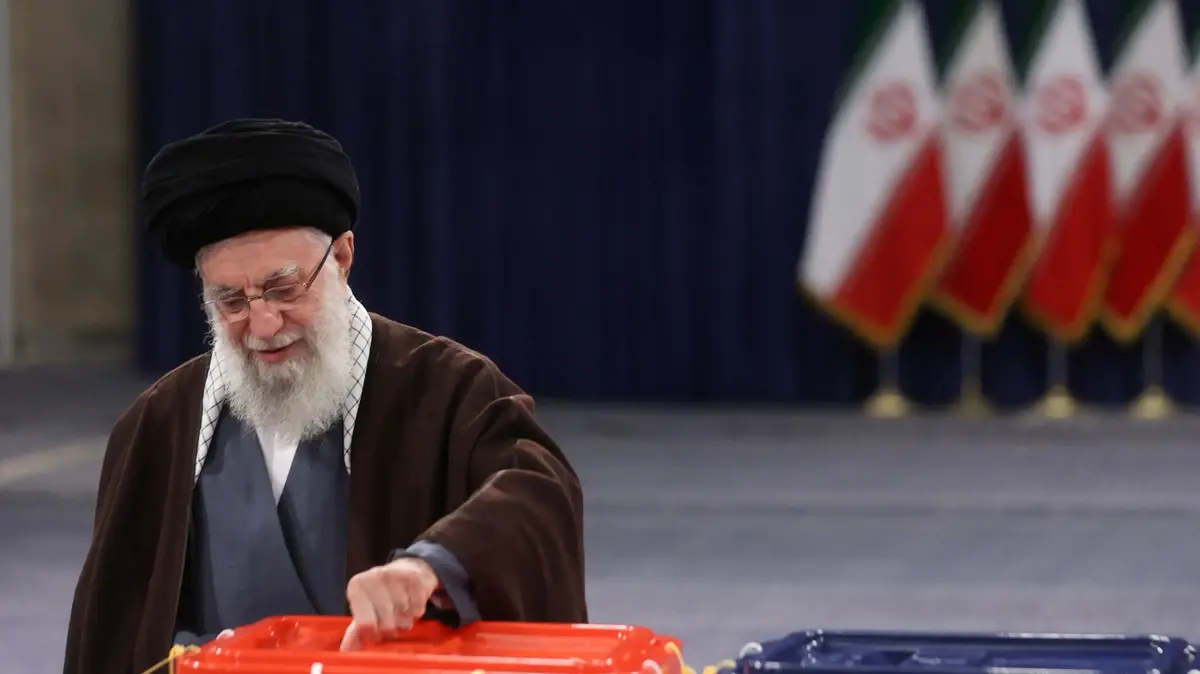Elections in Iran: Khamenei called on citizens to vote en masse/Iranian TV
Iran's Supreme Leader Ali Khamenei votes in parliamentary elections, March 1, 2024/Reuters
Iran is holding parliamentary elections today (Friday) in which the extreme conservatives are expected to strengthen their power, while the big question that remains open is what the turnout will be.
The parliamentary elections, the Majles, are the first in the Islamic Republic since the hijab protests that shook its stability in 2022.
The regime did repress them with violence, but the frustration with it has only increased since then, and many citizens are expected to stay at home as a sign of protest.
Iran's supreme leader, Ali Khamenei, called the vote a "religious duty".
"Vote in the early hours," Khamenei urged citizens, after being the first person to vote today.
Khamenei accused Iran's "enemies," a term he often uses to describe the United States and Israel, of trying to create despair among Iranian voters.
"The eyes of Iran's friends and enemies are today on the results (of the elections). Make the friends happy and disappoint the enemies," Khamenei told state television, against the background of the war raging in the region since the Hamas attack on Israel on October 7.
But the polls show that only about 41% of those with the right to vote will bother to go to the polls and choose between candidates who offer very little change.
Politicians from the moderate camp stayed out of the race, while the reformist camp said the elections were "not free and fair."
He said that voting is a "religious duty".
Khamenei points, the morning/Reuters
According to the Ministry of the Interior, 15,200 candidates - who were carefully screened by the regime - will run for the 290-seat parliament, whose influence is limited.
He mainly deals with domestic policy, while the 84-year-old supreme leader makes the decisions in the foreign and nuclear fields.
At the same time as the parliamentary elections, 88 members of the Council of Experts will be elected, a highly influential governing body that, among other things, will determine who will be Khamenei's successor.
Mehran, a 22-year-old student from the city of Isfahan in central Iran, told why he is boycotting the elections.
"I want a change in the regime, and I decided not to vote because it will only strengthen the grip of the Islamic Republic. I want to live freely," he told Reuters.
On the other hand, Zahra, a 26-year-old housewife from Tehran, said that she will vote so that "the world will understand that we support our leader (Khomeini) as he said that voting is our duty."
The secret?
rowing swimming
How to look and feel great, live healthy and lose weight?
In collaboration with TI SWIM
Opponents of the regime will stay at home.
A woman without a veil on the streets of Tehran, yesterday/Reuters
The desperation in the Iranian public also stems from the economic crisis, a consequence of the American sanctions, mismanagement and corruption among the Shiite regime.
Regime opponents and opposition organizations spread the hashtag VOTENoVote# on social networks, which calls on Iranians to stay at home in order not to legitimize the Islamic regime.
In the previous parliamentary elections, which were held with the outbreak of the corona epidemic in March 2020, a low was recorded in the voting rate reaching 42.5%.
Just four years earlier, when many believed that Iran's economic and political situation was going to improve thanks to the nuclear deal, 62% of those with the right to vote exercised it.
Women's rights activist Nargas Mohammadi, a Nobel Peace Prize laureate serving a long prison sentence, described the elections as a "fraud."
She won the prize in October, against the background of the struggle of Iranian women against the religious oppression they have been experiencing since the Islamic revolution in 1979.
The hijab protests erupted with the death in the custody of the morality police of the Kurdish young woman Mehsa Amini, who did not cover herself as required by law.
Thousands were arrested, hundreds were killed in clashes with the security forces and others were even executed.
More on the same topic:
Iran
Ali Khamenei

